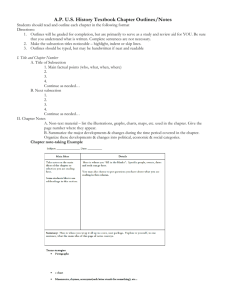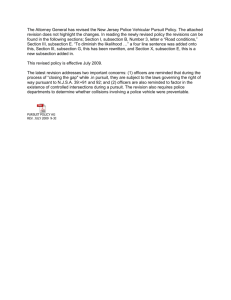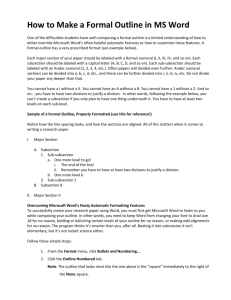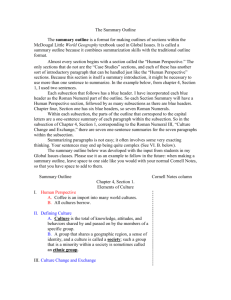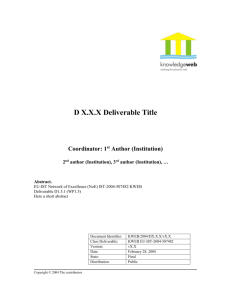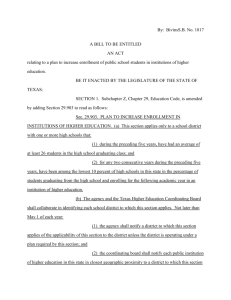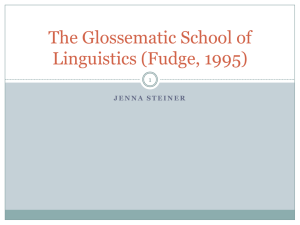Money laundering Memo - The Department of Justice and Equality
advertisement
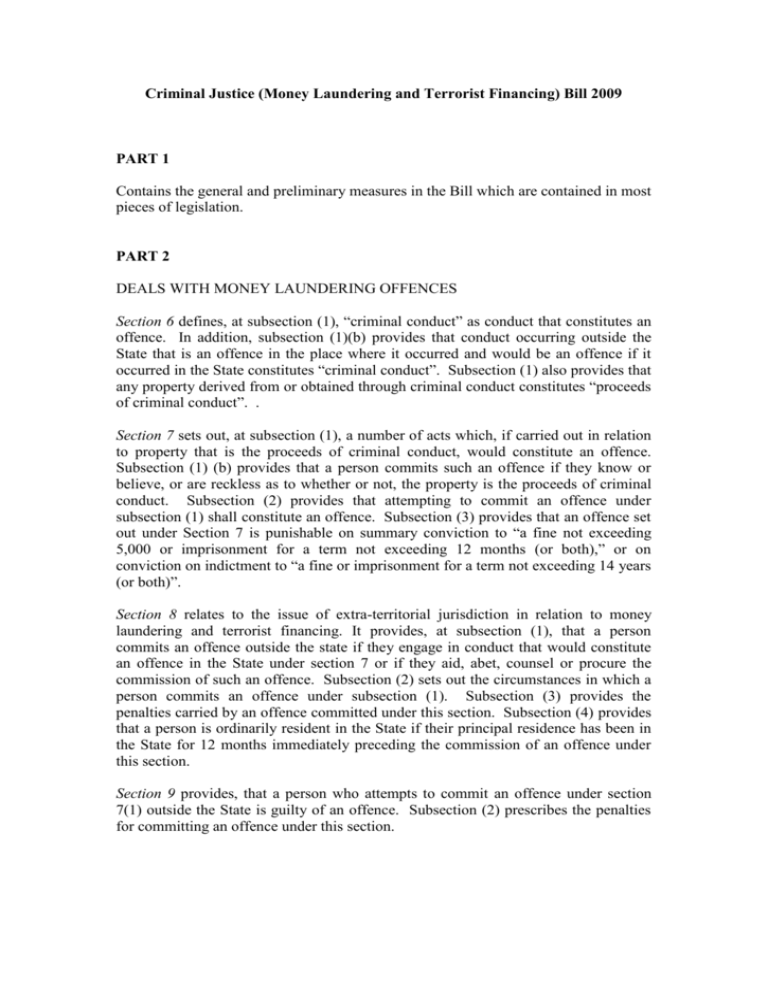
Criminal Justice (Money Laundering and Terrorist Financing) Bill 2009 PART 1 Contains the general and preliminary measures in the Bill which are contained in most pieces of legislation. PART 2 DEALS WITH MONEY LAUNDERING OFFENCES Section 6 defines, at subsection (1), “criminal conduct” as conduct that constitutes an offence. In addition, subsection (1)(b) provides that conduct occurring outside the State that is an offence in the place where it occurred and would be an offence if it occurred in the State constitutes “criminal conduct”. Subsection (1) also provides that any property derived from or obtained through criminal conduct constitutes “proceeds of criminal conduct”. . Section 7 sets out, at subsection (1), a number of acts which, if carried out in relation to property that is the proceeds of criminal conduct, would constitute an offence. Subsection (1) (b) provides that a person commits such an offence if they know or believe, or are reckless as to whether or not, the property is the proceeds of criminal conduct. Subsection (2) provides that attempting to commit an offence under subsection (1) shall constitute an offence. Subsection (3) provides that an offence set out under Section 7 is punishable on summary conviction to “a fine not exceeding 5,000 or imprisonment for a term not exceeding 12 months (or both),” or on conviction on indictment to “a fine or imprisonment for a term not exceeding 14 years (or both)”. Section 8 relates to the issue of extra-territorial jurisdiction in relation to money laundering and terrorist financing. It provides, at subsection (1), that a person commits an offence outside the state if they engage in conduct that would constitute an offence in the State under section 7 or if they aid, abet, counsel or procure the commission of such an offence. Subsection (2) sets out the circumstances in which a person commits an offence under subsection (1). Subsection (3) provides the penalties carried by an offence committed under this section. Subsection (4) provides that a person is ordinarily resident in the State if their principal residence has been in the State for 12 months immediately preceding the commission of an offence under this section. Section 9 provides, that a person who attempts to commit an offence under section 7(1) outside the State is guilty of an offence. Subsection (2) prescribes the penalties for committing an offence under this section. Section 10 provides that it is an offence to aid, abet, counsel or procure the commission of an offence proscribed under section 7. Subsection (2) sets out the liability for committing an offence under this section. Section 11, defines “specified conduct” for the purposes of this section. It prescribes that an accused is presumed to have known or believed that property was the proceeds of criminal conduct where it is reasonable to conclude that the accused knew or believed, or was reckless as to whether or not, the property was the proceeds of criminal conduct. This presumption shall apply in proceedings for an offence under section 7, 8(1)(a) or 9, unless there is a reasonable doubt that the accused knew or believed, or was reckless as to whether, the property is the proceeds of criminal conduct. Subsection (3) allows circumstances in which an accused has engaged in, or attempted to engage in, specified conduct in relation to property which it is reasonable to conclude is the proceeds of criminal conduct, to be taken as evidence that the property is the proceeds of criminal conduct. Subsection (4) lists certain circumstances in which it is reasonable to conclude that property is the proceeds of criminal conduct. Subsection (6) clarifies that it is possible for subsections (2) and (3) to be applied in the same proceedings. Subsection (7) provides that this section applies to proceedings brought under section 8(1)(b), section 10, section 7 of the Criminal Law Act 1997 which proscribes the aiding, abetting, counseling or procuring the commission of an offence under section 7, 8 or 9 Section 12 enables proceedings for an offence committed outside the State under section 8, 9 or 10 to be taken in the State and provides that the offence may be treated as having been committed in the State. Section 13 requires the consent of the Director of Public Prosecutions to be given in order for further proceedings to be taken where a person is charged with an offence under section 8, 9 or 10. Section 14 provides, at subsection (1), that where property which is alleged to be the proceeds of criminal conduct which has taken place outside the State, a certificate by a practicing lawyer in that place stating that such conduct is an offence in that place shall be taken to be evidence of the matters contained in the certificate unless the contrary is shown. Subsection (2) provides that such a certificate is presumed to have been signed by the person purporting to have signed it unless otherwise shown. Section 15 prohibits proceedings being taken against a person for an offence under section 8, 9 or 10 where they have been acquitted or convicted outside the State of an offence consisting of the same, or substantially the same, conduct. Section 16 states that a reference to an offence outside the State includes a reference to an offence in connection with taxes, duties, customs or exchange regulation. PART 3 CONCERNS DIRECTIONS ORDERS AND AUTHORISATIONS RELATING TO INVESTIGATIONS Section 17 provides, at subsection (1) that a member of the Garda Síochána not below the rank of superintendent may direct a person not to carry out a service or transaction for a period not exceeding 7 days. Subsection (2) provides that a judge of the District Court may order a person not to carry out a specific service or transaction for a period not exceeding 21 days if satisfied on information given by a member of the Garda Síochána that the service or transaction would compromise or assist in money laundering or terrorist financing. Subsection (3) provides that such an order may be made on more than one occasion. Subsection (4) requires that an application for an order under subsection (2) shall be made in the district in which the order is to be served. Subsection (5) sets down the penalties for failure to comply with a direction or order made under this section. Section 18, subsection (1) requires the member of the Garda Síochána who gave the direction or applied for the order to ensure, as soon as practicable after the direction is given or order is made, that any person who the member is aware is affected by the direction or order is given written notice thereof. Subsections (1)(a) and (1)(b) relieve the member of the requirement to give notice where it is not reasonably practicable to locate the person or where disclosure to the person would adversely affect the investigation in respect of which the direction or order is given. Subsection (2) requires a member of the Garda Síochána to give written notice of the direction or order where a person who is, or appears to be, affected by the direction or order is aware that such direction or order has been made, notwithstanding that disclosure of such may prejudice the investigation. Section 19 provides that a judge of the District Court may revoke a direction or order if the judge is satisfied, on the application of a person affected by the direction or order, that the circumstances envisaged under section 17 do not, or no longer, apply. Section 20 provides that a judge of the District Court may, on application by any person affected by a direction or order, make any order appropriate in relation to any of the property if it is necessary to do so to enable the person to discharge reasonable living and other necessary expenses or to enable them to carry on a business, trade, profession or other occupation to which any of the property relates. Section 21 provides, at subsection (1) that a direction or order shall cease to have effect if the investigation into whether the service or transaction would compromise or assist in money laundering or terrorist financing has ceased. Subsection (2) requires a member of the Garda Síochána to give written notice of the fact that the direction or order has ceased to have effect to the person to who the direction or order has been given and any other person who the member is aware is affected by the direction or order. Section 22 prohibits the disclosure of a report made under Chapter 4 of Part 4 of the Bill to any person other than the judge of the relevant District Court. Section 23 provides that a member of the Garda Síochána not below the rank of superintendent may, by written notice, authorize a person to engage in an act prohibited under section 7(1) if the member is satisfied that the act is necessary for the investigation of an offence. Section 7(1) makes it an offence to carry out certain acts in relation to property that the person knows or believes or is reckless as to whether the property is the proceeds of criminal conduct. Part 4 CONTAINS THE PROVISIONS RELATING TO THE FINANCIAL SERVICES SECTOR, PROFESSIONAL SERVICE PROVIDERS AND OTHERS Section 24 Provides definitions of various terms related to the financial services Industry, professional service providers and others Section 25 Defines the meaning of the term “designated person” for the purposes of the Bill. The term encompasses any person working in the State in any of the following capacities: a credit or a financial institution unless specifically excepted, an auditor external accountant or tax adviser, a relevant independent legal professional, a trust or company service provided, a property service provider, a casino, a person who directs a private members club at which gambling activities are carried out, a person trading in goods in respect of transactions involving the receipt of cash of at least €15,000 or any other person of a prescribed class. The section also sets out the criteria for persons who, while operating as a credit or a financial institution in the course of business, are not to be treated as designated persons for the purposes of the Bill. Subsection (9) gives the Minister the power to prescribe any other class of persons to whom the section should apply. Section 27 defines the meaning of the term “beneficial owner” in relation to partnerships, meaning a person who is entitled to or controls directly or indirectly, more than 25% of the capital, profits or voting rights in the partnership or otherwise exercises control over the management of the partnership.. Section 28 defines the meaning of the term “beneficial owner in relation to trusts, meaning a person who is entitled to a vested interest in possession, remainder or reversion, in at least 25% of the capital of the trust property, the class of person in whose main interest the trust is set up or operates and any person who has control over the trust. The meaning of the term “control” in relation to trust is also set out in this section. Section 29 defines the term “beneficial owner” in relation to estates of deceased persons in the course of administration meaning the executor or administrator of the estate concerned. Section 30 outlines others who are “beneficial owners for the purposes of the Bill, including any individuals who benefit from at least 25% of the property of an entity or arrangement and any individual who ultimately owns or controls a body corporate which benefits from or exercises control over the property of the entity or arrangement. Section 31 relates to the designation of places other than Member States of the European Union which may be designated by the Minister, after consultation with the Minister for Finance, as places which impose requirements equivalent to those specified in the Third Money Laundering Directive in circumstances where the Minister is satisfied that this is the case. Subsection (2) sets out the conditions where such a designation does not apply. Section 33 (application of Customer Due Diligence) relates to the identification and verification of customers and beneficial owners and the application of both simplified and enhanced Customer Due Diligence in specified circumstances and at specified times in the business relationship. Subsection (2) sets out the particular measures which should be applied in establishing customers’ identity and beneficial owners connected with the customer or the service concerned. The subsection sets out the kind of documents or information which can be relied upon to confirm the identity of a customer including documents from a government source or a prescribed class or combination of documents. Subsection (4) sets out the measures which should be applied by a designated person where a customer who is an individual, is not physically present for verification of his or her identity. While verification of a customer’s identity should, in most circumstances, be undertaken prior to the establishment of a business relationship, such verification may be undertaken during the establishment of the business relationship if there are reasonable grounds to believe that to do so prior to that time would interrupt the normal conduct of business and where there is no real risk that the customer concerned or the service being sought is for the purpose of money laundering or terrorist financing. Subsection (9) states, that it is an offence, (except as provided in section 34), if a designated person fails to comply with the requirements in relation to the application of Customer Due Diligence, as set out in this section. In such circumstances a designated person is liable on summary conviction, to a fine not exceeding €5,000 or imprisonment for a term not exceeding 12 months or both. On conviction on indictment a person will be liable to a fine or to imprisonment to a term not exceeding 5 years or both. Subsection (11) gives the Minister power to prescribe a class of documents or a combination of classes of documents which would be adequate in the Minster’s view to verify the identity of customers of a designated person. Section 34 This section provides for exemptions from the requirements in relation to Customer Due Diligence which are set out in section 33 in relation to a specified customer or a specified product as the case may be. Such an exemption will apply in relation to a the beneficial ownership of money held or proposed to be held in trust in a client account within the meaning of the Solicitors (Amendment) Act 1994 or in an account for a person who by way of business, provides legal or notarial services for those clients. Subsection (4) provides that a credit institution may apply the exemption relation to the beneficial ownership of money held in trust in a credit institution in the credit institution is satisfied that the information on the identity of the beneficial owners of the money held in the account is available on request. For the purposes of this section, a specified product is a life insurance policy having an annual premium of no more than €1,000 or a single premium of no more than €2,500, also an insurance policy in respect of a pension scheme that does not have a surrender clause and cannot be used as collateral and a pension scheme providing for retirement benefits to employees where the rules of the scheme do not allow a member’s interest to be assigned. A specified product also applies, for the purposes of this section, to electronic money within the meaning of Article 1(3) (b) of Directive 2000/46/EC of the European Parliament and Council of 18 September 2000. Section 35 relates to special measures applying to business relationships in the context of obtaining information which may be reasonably warranted by the risk of money laundering or terrorist financing. A designated person shall not provide the service sought by the customer if, as a result of a failure on the part of the customer, he is unable to obtain the information required. Subsection (3) provides that a designated person shall monitor dealings with a customer with whom the person has a business relationship by scrutinising transactions and the source of wealth or funds for those transactions, to determine whether the transactions are consistent with knowledge of the customer and the customer’s business, the pattern of transactions and any knowledge that the customer may be involved in money laundering or terrorist financing. Section 36 provides that a designated person may be exempt from the requirements of section 35(1) if there are reasonable grounds to believe that the customer or the product concerned is a specified customer or a specified product within the meaning of section 34. This exemption does not apply if the customer is from a place designated under section 32 or if section 33(1) (c) or (d) or 4 applies or if it is necessary to apply measures in relation to the customer or beneficial owner under section 37. Enhanced Customer Due Diligence for Politically Exposed Persons residing outside the State – Section 37 provides that a designated person shall take steps to determine whether a customer or a beneficial owner residing outside the State is a politically exposed person or an immediate family member or a close associate of a politically exposed person. The steps to be taken by the designated person in relation to this provision are steps that are reasonably warranted by the risk that the customer or the beneficial owner is involved in money laundering or terrorist financing. The steps taken include determining the source of wealth and of funds involved in the proposed business relationship or in the transaction or transactions and ensuring that approval is obtained from senior management of the designated person. Subparagraph (9) sets out the meaning of a Politically Exposed Person and a “close associate “and “an immediate family member” of a Politically Exposed Person. For the purposes of the Bill a Politically Exposed Person means an individual who is or was in the preceding year, entrusted with a prominent public function including a member of an administrative, management or supervisory body of a state owned enterprise, a head of state, head of government a government minister or deputy or assistant minister, a member of parliament, a member of a supreme court, constitutional court or other high level judicial body, a member of a court of auditors or the board of a central bank, an ambassador chargé d’affairs or high ranking officer in the armed forces. Subsection (10) provides that the Minster may, if he or she thinks it is appropriate, prescribe a particular class of family member of a Politically Exposed Person for the purposes of the definition of immediate family member”. Section 38 sets out the conditions under which a credit institution shall enter into a correspondent banking relationship with another credit institution (“ the respondent institution”) in a place other than a Member State of the European Union. The provisions of the section require a credit institution to take a number of steps prior to commencing the banking relationship, including: gathering sufficient information about the respondent institution to fully understand the nature of the business, being satisfied with the soundness of the anti money laundering and anti terrorist financial controls, ensure approval from senior management of the credit institution and document the responsibilities of each institution in applying anti-money laundering and anti-terrorist financing controls in the conduct of the corresponding banking relationship. Section 39 provides that a designated person may apply measures in relation to customers or beneficial owners that are additional to those specified, for the purpose of preventing or detecting money laundering or terrorist financing. Reporting of suspicious transactions and of transactions involving certain places Section 41 clarifies the meaning of a “designated person” for the purposes of this Chapter. Section 42 requires a designated person to report to the Garda Síochána and the Revenue Commissioners any knowledge or suspicion they have that another person is engaged in money laundering or terrorist financing. Subsection (2) provides that such a report should be made as soon as practicable. Subsections (3), (4) and (5) deal with the meaning of “reasonable grounds” as required under subsection (1). Subsection (6) prescribes the content that should be included in a report made under this section. Subsection (7) provides the circumstances in which a designated person may proceed with a suspicious service or transaction prior to the sending of the report to the Garda Síochána and the Revenue Commissioners. Subsection (8) states that subsection (7) does not authorize a person to proceed with a service or transaction if they have been directed or ordered otherwise. Subsection (9) sets out the penalties for an offence committed under this section. Subsection (10) explains the reference in subsection (7) to a suspicious transaction or service. Section 43 requires, at subsection (1), a designated person to report any service or transaction carried out in their capacity as a designated person and which is connected with a designated place (section 32). Subsection (2) details the penalties carried by an offence committed under this section. Section 44 provides, at subsection (1), without prejudice to the method of reporting set out in section 42 or 43, that a report may be made in accordance with an internal reporting procedure. Subsection (2) allows a defendant charged under section 42 or 43 to prove, in his or her defence, that they were an employee making a report in accordance with an internal reporting procedure. Section 45 enables information included in a report under this Chapter to be used in an investigation into money laundering or terrorist financing or any other offence. Section 46 sets out the circumstances in which disclosure of information is not required. Section 47 provides that disclosure of information under this Chapter shall not be a breach of any restriction imposed by any other enactment or rule of law. Tipping off by designated persons Section 48 defines “legal adviser” as a barrister or solicitor. Section 49 prohibits, at subsections (1) and (2), a designated person from making any disclosures likely to prejudice any ongoing or future investigation. Subsection (3) sets out the penalties for failing to comply with this section. Subsection (4) lists a number of persons who may be included in the term designated person. Section 50 provides that it is a defense for a person charged with an offence under section 49 to prove that the disclosure was to a customer of the defendant or designated person, the defendant or designated person was directed or ordered under section 17 not to carry out any service or transaction in respect of the customer and this fact was the extent of the disclosure. It is also a defense if the disclosure was solely to the effect that the defendant or a designated person on whose behalf the defendant made the disclosure, had been directed by An Garda Síochána or ordered by a judge of the District Court not to carry out a service. Section 51 provides, at subsection (1), it is a defense to an alleged offence under section 49 for an accused to prove that they were acting in a specific capacity listed in paragraph (a) and that they made the disclosure to another person acting in a similar capacity. Subsection (2) provides a defense to such proceedings where a person can prove that the disclosure was made by a credit or financial institution to another such institution situated in a Member State or designated place (section 31) and both institutions belonged to the same group. Subsection (3) provides a defense where the person was a legal or relevant professional adviser at the time of the disclosure. Section 52 provides a defense for a person listed in subsection (1) in proceedings for a section 49 offence where they can prove that the disclosure related to a current or former customer, a transaction or service involving the person and the institution or adviser and the disclosure was made to prevent money laundering or terrorist financing. The institution or adviser to whom the disclosure was made must also have been situated in a Member State or designated place (section 31) and both the institution/adviser making and receiving the disclosure must have been subject to equivalent duties of professional confidentiality and the protection of personal data. Subsection (3) provides that a client of a solicitor who seeks advice from a barrister is, in the case of an adviser who is a barrister, a customer for the purposes of this section. Section 53 provides further defenses to a person against whom proceedings are being taken for an offence under section 49. Internal policies and procedures, training and record keeping Section 54 directs, at subsection (1), that a designated person shall adopt policies and procedures in relation to the designated person’s business to prevent and detect money laundering and terrorist financing. Subsections (2), (3), (4), (5) and (6) detail the type of policies and procedures to be implemented. Subsection (8) sets out the penalties for failure to comply with this section. Section 55 requires a designated person to keep records evidencing the procedures applied and information gathered by the designated person in relation to each customer and where section 38 applies each correspondent banking relationship. Subsections (2) to (8) prescribe in further detail the requirements of the section, such as the method of recording and the length of time for which the records must be retained. Subsection (9) enables the Minister to make regulations in respect of the retention of records. Subsection (10) provides the penalties applicable for failure to comply with this section. Special provisions applying to credit and financial institutions Section 56 requires that a credit or financial institution that is a designated person, have systems in place to enable it to respond efficiently to enquiries from An Garda Síochána in relation to its business relationships, and the nature of such relationships, with a person specified by An Garda Síochána. Subsection (2) sets out the penalties for failing to comply with subsection (1). Section 57 requires that any branches or subsidiaries, outside a Member State, of a credit or financial institution that is a designated person, comply with requirements equivalent to those set out in Chapters II and IV of the Third Money Laundering Directive. If this is not possible, subsection (2) requires the designated person to inform the competent authority and apply measures to address the risk of money laundering or terrorist financing. Subsection (3) directs that a credit or financial institution that is a designated person and incorporated in the State communicate policies and procedures adopted under section 54 to branches or subsidiaries outside a Member State. Subsection (4) sets out the penalties for failing to comply with this section. Section 58 prohibits, at subsection (1), the setting up of anonymous accounts or the provision of anonymous passbooks by credit or financial institutions. Subsection (2) prohibits such an institution from retaining anonymous accounts or passbooks that came into existence before this section came into force. Subsection (3) provides the liability attached to an offence committed under this section. Section 59 proscribes, at subsection (1), the entering, by a credit institution, into a banking relationship with a shell bank. Subsection (2) provides that any pre-existing arrangements shall cease to continue on the commencement of this section. Subsection (3) requires a credit institution to refrain from engaging in or continuing a correspondent banking relationship with a bank where the institution is aware that the bank permits its accounts to be used by a shell bank. Subsection (4) directs that a credit institution adopt measures to ensure that it does not enter into or continue a correspondent banking relationship with a bank engaged in such activities. Subsection (5) details the penalties carried by an offence under this section. Subsection (6) defines a “shell bank”. Monitoring Section 60 explains the meaning of the term “competent authority”. Subsection (2) lists persons or entities which may be considered a competent authority in the event that no competent authority is prescribed for a class of designated persons as envisaged in subsection (1). Subsection (3) provides that, in certain circumstances, the Minister may prescribe a competent authority for a class of designated persons. Section 61 provides, at subsection (1), that where there is more than one competent authority they may agree between them that one of them will act as the competent authority for that designated person. Subsection (2) provides that such an agreement shall be effective when written notice has been given to the person. Subsection (3) sets out the circumstances in which such an agreement will cease to have effect. Section 62 lists the competent authorities which may be referred to as State competent authorities. Subsection (2) provides the circumstances in which the Minister may prescribe a competent authority as a State competent authority. Section 63 sets out the functions and duties of a competent authority; namely, securing compliance by designated persons with the requirement of this Part of the Bill. Section 64 provides that nothing in this Part limits any function that a competent authority has under any other enactment or rule of law. Section 65 requires a competent authority to include an account of its activities in relation to the performance of its functions in each annual report published. Section 66 relates to requests to bodies to provide relevant information relating to designated persons and sets out at subsection (1), the nature of such relevant information. Subsections (2) and (3) set out the circumstances in which a State competent authority may request relevant information. Subsection (4) requires a body that receives a request under this section to disclose the relevant information. Subsection (5) enables the Minister to prescribe information that a State competent authority may request under this section. Section 67 permits, at subsection (1), a State competent authority to direct a designated person to provide information or documents as specified by written notice. Subsection (2) sets out the penalties for failure to comply with this section. Subsections (3) and (4) provide that the State competent authority should specify the manner and time in which the information is to be furnished and that a person should only furnish documents in their possession or documents which can be obtained lawfully. Subsection (5) requires a person who knows the whereabouts of documents sought to give a statement identifying the whereabouts thereof. Failure to comply with subsection (5) is an offence, the penalties for which are set out in subsection (6). Subsections (7) and (8) provide that the document shall be furnished in written form unless otherwise directed and that a State competent authority may take copies of such documents. Subsection (9) directs that the furnishing of documents under this section shall not prejudice any lien held over an item forming part of any documents furnished. Section 68 provides that a State competent authority may direct a designated person to furnish an explanation in relation to any documents furnished to the authority under section 67 or lawfully removed from premises under section 78. Subsection (2) requires the authority to specify the time and manner in which the explanation is to be furnished. Subsection (3) sets out the penalties for failure to comply with a direction under this section. Section 69 provides that a State competent authority may only give a direction under section 67 or 68 if the information or documents are reasonably required by the authority to assist it in the performance of its functions. Section 70 provides that a person is not required to comply with a direction under section 67 or 68 where to do so might tend to incriminate them. Section 71 enables a State competent authority to direct a designated person to discontinue or refrain from engaging in conduct which may constitute a breach of this Part of the Bill. Subsection (2) requires such a direction to specify the time in which a direction is to be complied with. In the event that such a direction is not complied with and the person is found guilty of an offence due to the conduct specified in the direction, subsection (3) provides that the court shall take the failure to comply into account as an aggravating factor in determining any sentence to be imposed. Section 72 provides, at subsection (1), that a State competent authority may appoint employees or other persons to be authorised officers for the purpose of this Part. Subsections (2) and (3) enable the authority to revoke such an appointment in writing. Subsection (4) sets out the circumstances in which a person’s appointment as an authorized officer ceases. Section 73 requires that every authorised officer appointed by a State competent authority be furnished with a warrant of appointment and the officer shall produce the warrant for inspection if requested by an person affected by the performance of the officer’s functions. Section 74 provides that an authorised officer may only exercise powers for the purpose of assisting the State competent authority that appointed the officer. Section 75 confers on authorised officers the power to enter premises and sets out the circumstances in which this power may be exercised. Section 76 prohibits an authorised officer from entering a premises used only for residential purposes unless with the permission of the occupier or under the authority of a warrant under section 79. Section 77 sets out, at subsection (1), the activities which an authorised officer may undertake on lawfully entering a premises. Subsection (2) requires a person to whom a request is made in accordance with subsection (1) to comply with the request where possible and give such assistance and information to the authorised officer as is reasonable. Subsections (3) and (4) clarify the meaning of references to data equipment and a person who operates such equipment. Section 78 provides, at subsection (1), the circumstances in which an authorised officer may apply to a judge of the District Court for a warrant under this section. Subsection (2) enables a District Court judge to issue a warrant under this section in order to permit an authorised officer to enter the relevant premises and to exercise the powers conferred on the officer by this Part or by the warrant. Before the judge may issue a warrant, he or she must be satisfied that there are reasonable grounds for believing that there are documents contained on the premises that are required by the State competent authority and, where the application is in respect of a residential premises, that the occupier has refused entry to the officer. Subsection (4) states that entry to a premises authorised by warrant may be effected with reasonable force. Section 79 provides that an authorised officer may be accompanied and assisted by other authorised officers, members of the Garda Síochána or other appropriate persons. Section 80 makes it an offence to obstruct or interfere with an authorised officer in their powers or to fail to comply with a requirement or request made by an officer under section 78. Subsection (2) sets out the penalties carried by this offence. Subsection (3) clarifies the meaning of references in this section to an authorised officer. Section 81 provides that nothing in this Part of the Bill requires a person to answer questions which might tend to incriminate them. Section 82 provides that nothing in this Part requires the production of documents or information subject to legal privilege. Section 83 states that the production of documents or information in accordance with a section 78 request shall not, on disclosure by the person receiving it, be treated as a breach of any restriction under any enactment or rule of law. Subsection (2) provides that production of any item forming part of the documents shall not prejudice any lien in place over that item. It provides for the authorisation and registration procedure for persons carrying on the business of a Trust and Company Service Provider, who are not already regulated as members of a designated accountancy body, and who are not a barrister or solicitor, or a credit institution or financial institution. This is required in order to implement Article 36 of the 3rd Money Laundering Directive which provides, inter alia, that trust and company service providers shall be licensed or registered and that a “fit and proper” test be applied to persons who direct or are the beneficial owners of such businesses. These provisions are based on existing provisions which apply to bureau de change and money transmitters under Part V of the Central Bank Act 1997, as inserted by Section 27 of the Central Bank and Financial Services Authority of Ireland Act 2004. Section 84 defines a number of terms used. In particular it defines the term “trust or company service provider” to exclude a member of a designated accountancy body, a barrister or solicitor, or a credit institution or financial institution, as these categories are already subject to regulation. Section 85 specifies certain matters which would disqualify a person from being considered “a fit and proper person” for the purposes of an authorisation. These include having certain criminal convictions, refusing due payment of debt, being an undischarged bankrupt or otherwise not being a fit and proper person. Section 86 provides that these provisions apply to each member of a partnership which applies for or holds an authorisation unless otherwise specified. Section 87 provides that it is an offence to carry on the business of a Trust or Company Service Provider without an authorisation from the Minister. This Section also provides for penalties on summary conviction and on conviction on indictment. Section 88 outlines the procedure to be followed by persons applying for an authorisation under this Chapter. The application must specify the name of any beneficial owner of the business. The section also gives the Minister the power to seek additional information. Applicants must also provide consent to allow access to personal data from any source where this is necessary to assess whether the applicant fulfils the “fit and proper” test. The Minister may provide for the payment of fees for an application for an authorisation or the renewal of an authorisation. Section 89 deals with the grant and refusal of an authorisation. It provides that the Minister may refuse an application only if certain conditions are met. These include failure to comply with the application procedure, provision of false or misleading information, failure to meet the “fit and proper” test by an applicant or beneficial owner or failure to satisfy the Minister that the applicant can fulfil the requirements of the Act or of an authorisation. It also provides that where the Minister proposes to refuse an application he must state grounds to the applicant and allow the applicant to make representations stating why the application should be granted. The Minister may refuse an application only after considering any such representations. Where the Minister refuses an application he must give notice to the applicant stating the grounds for the refusal and informing the applicant of the right to appeal to an Appeal Tribunal provided for under Section 102. Section 90 allows the Minister to impose conditions on an authorisation if he considers this necessary for the orderly regulation of the business or for the prevention of money laundering or terrorist financing. Where the Minister imposes conditions he must state the reasons for the conditions and inform the applicant of the right of appeal to an Appeals Tribunal provided for under Section 102. Section 91 provides for an authorisation under Chapter 9 to have a term of three years. Section 92 outlines the procedure for renewal of an authorisation which includes a requirement that an application for renewal shall be made not less than 10 weeks before the expiry of the authorisation. Section 93 gives the Minister power to amend an existing authorisation. It provides that where the Minister proposes to amend an authorisation he must state reasons to the applicant and allow the applicant to make representations stating why the authorisation should not be amended. The Minister may amend an authorisation only after considering any such representations. Where the Minister amends an authorisation he must give notice to the applicant stating the grounds for the amendment and informing the applicant of the right to appeal to an Appeal Tribunal provided for under Section 102. Section 94 provides that it is an offence for the holder of an authorisation not to comply with any conditions or prescribed requirements attaching to the authorisation. Section 95 provides that the holder of an authorisation shall take reasonable steps to ensure that any principal officer or beneficial owner of the business is a fit and proper person. Section 96 provides that the Minister shall revoke an authorisation on the application of the holder only if the holder has fully complied with the requirements of the authorisation and certain requirements of the Act. Section 97 deals with the revocation of an authorisation other than on application of the holder. It provides that the Minister may revoke an authorisation only if he is reasonably satisfied of certain matters. These include provision of false or misleading information, failure to meet the “fit and proper” test by the holder or beneficial owner or failure to meet the requirements of the Act or of an authorisation. It also provides that where the Minister proposes to revoke an authorisation he shall state the grounds to the holder and allow the holder to make representations stating why the authorisation should not be revoked. The Minister may revoke the authorisation only after considering any such representations. Where the Minister revokes an authorisation he must give notice to the applicant stating the grounds for the revocation and informing the holder of the right to appeal to an Appeal Tribunal provided for under Section 101. Section 98 provides that the Minister may prohibit the holder of an authorisation from carrying on business as a trust or company service provider other than in accordance with specified conditions where the Minister reasonably believes that there may be grounds for revoking the authorisation under Section 98. The holder has the right to appeal to an Appeal Tribunal against such a direction. Section 99 provides that the Minister shall publish in Iris Oifiguil particulars of any revocation of an authorisation under Section 96 or 97 or of any direction under Section 98. Section 100 outlines the procedures for appeals by a person who is aggrieved by a decision of the Minister under Sections 89, 90, 92, 93, 97 and 98. It also provides that the person making an appeal or the Minister may appeal to the High Court on any question of law arising from a determination by the Appeal Tribunal. Section 101 provides for the establishment by Ministerial order of an Appeal Tribunal to hear appeals made under Section 100. A person who is appointed to such an Appeal Tribunal must be a solicitor or a barrister of at least 7 years standing. Section 102 provides that the Minister may request information from the Commissioner of the Garda Síochána which the Minister requires in order to establish whether any applicant for an authorisation to operate a business as a trust or company service provider or a beneficial owner is a fit and proper person. Section 103 provides that the Minister may exercise any of the powers of a competent authority under Chapter 8 in exercising his functions in relation to trust or company service providers under Chapter 9. Section 104 provides for the keeping of a register of holders of authorisations under Chapter 9 and for the public availability of the register. Section 105 provides that the Minister shall publish annually in Iris Oifiguil a list of holders of authorisations. Section 106 makes provision for the keeping of records by holders of an authorisation and gives the Minister power to make regulations in relation to the retention of records. It also makes it an offence not to comply with the requirements of the Section. Other matters in the Bill Section 107 enables the Minister for Finance to approve codes of practice to assist designated persons on the application of this Part of the Bill. Subsection (2) provides a defense to an offence under this Part where the defendant can show they took reasonable steps and exercised due diligence to avoid committing the offence. Subsection (3) provides that the court may have regard to the code of practice approved by the Minister for Finance in assessing the conduct of the defendant. This section does not limit the matters to which a court may have regard in determining whether the defendant took reasonable steps and exercised due diligence. Section 108, at subsections (1) and (2), enables the Minister to delegate any of his or her functions, which may be made subject to conditions or limitations, under Chapter 8 or 9 of this Part or under section 110 to an officer of the Department. The Minister may revoke a delegation under subsection (3) but while the delegation remains unrevoked it should be performed by the delegate (subsection 4). Under subsection (5) the Minister may perform functions which have been delegated. Subsection (6) states that this section does not affect the applicability of the general law to this Act in relation to the imputing of acts of an officer of a Minister to the Minister. Section 109 provides, at subsection (1), that a designated person shall register with the Minister in accordance with procedures which the Minister may prescribe. Subsection (2) makes failure to register where required an offence and sets out the penalties attached to that offence. Subsection (3) details the particulars to be entered into a register to be established and maintained by the Minister for the purposes of this section. Subsections (4) and (5) prescribe the form the register should take and where the register should be kept. Subsection (6) enables the Minister to set down particulars if they relate to the business or regulation of designated persons directing members’ clubs. PART 5 MISCELLANEOUS Sections 110 to 121 comprise mainly miscellaneous consequential amendments to a number of statutes.
